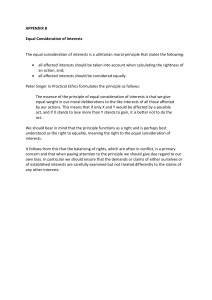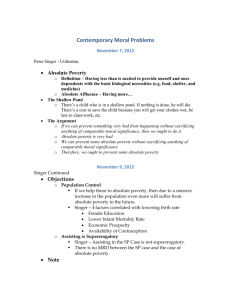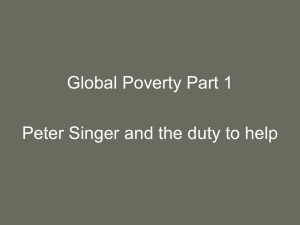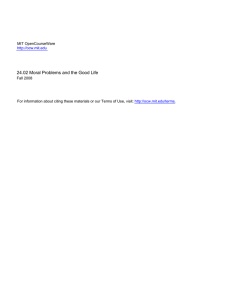Singer on Affluence and Morality
advertisement
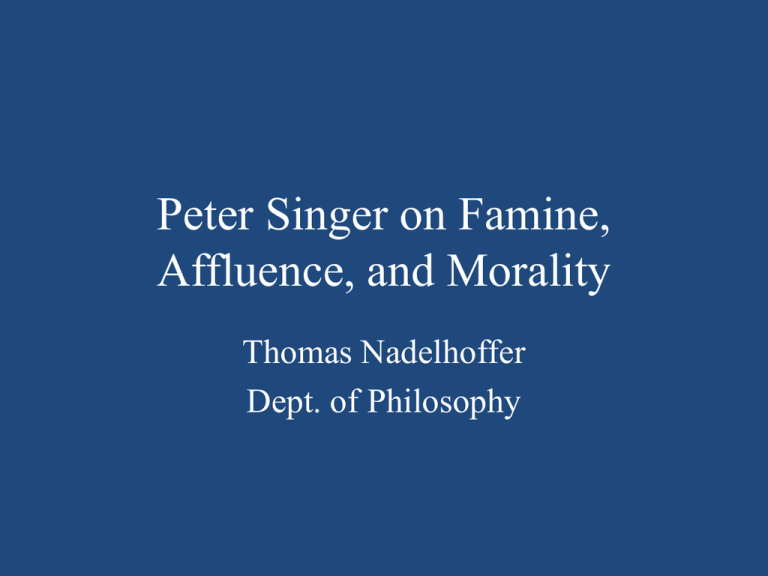
Peter Singer on Famine, Affluence, and Morality Thomas Nadelhoffer Dept. of Philosophy Elie Wiesel: Nobel Peace Laureate, Holocaust Survivor • “Sometimes we must interfere. When human lives are endangered, when human dignity is in jeopardy, national borders and sensitivities become irrelevant. Whenever men or women are persecuted because of their race, religion, or political views, that place mustat that moment- become the center of the universe." • “There may be times when we are powerless to prevent injustice, but there must never be a time when we fail to protest." Moral Malaise & Misguided Priorities • Steelers’ Heinz Field: $281 Million • Eagles’ Lincoln Financial Field: $512 Million The Toys of the Mega-Rich • World’s Most Expensive Private Jet: Airbus A380 • The “Flying Palace” • Cost: $300 Million • World’s Most Expensive “Gigayacht”: Wally Island • 325 ft. long and 70 ft. wide • Cost: $200 Million The Face of Famine Facts About Hunger & Poverty • Nearly one in four people live on less than $1 per day. • 3 billion people in the world today struggle to survive on $2 per day. • To satisfy the world's sanitation and food requirements would cost only US $13 billion--what the people of the United States and the European Union spend on perfume each year. The Key Moral Question • Every 3.6 seconds someone dies of hunger. • The question is: What, if anything, do we owe them? Peter Singer’s Challenge Two Fundamental Moral Assumptions: 1. Suffering and death from lack of food, shelter, and medical care are bad. 2. If it is in your power to prevent something bad from happening, without thereby sacrificing anything of comparable moral importance, we ought, morally, to do it. The Shallow Pond Singer’s Response • • • • • • • The Proximity Thesis Does Distance Make a Difference? Singer and the Sorties Paradox The Descriptive vs. the Normative Do Numbers Make a Difference? Singer and the Reductio ad Absurdum “Should I consider that I am less obliged to pull the drowning child out of the pond if on looking around I see other people, no further away than I am, who have also noticed the child but are doing nothing?” Charity vs. Duty • Charity as an ideal excuse for moral inactivity. • Upsetting the moral categories. • Helping as obligatory rather than supererogatory. • “The moral point of view requires us to look beyond the interests of our own society.” Objections: 1. 2. 3. 4. 5. Too drastic Over-demanding Counter-intuitive Population Control* Helping at Home First “What is the point of relating philosophy to public affairs if we do not take our conclusions seriously?” --Peter Singer Psychological Barriers “The statistics of mass murder or genocide—no matter how large the numbers—do not convey the true meaning of such atrocities. The numbers fail to trigger the affective emotion or feeling required to motivate action. In other words, we know that genocide in Darfur is real, but we do not “feel” that reality. In fact, not only do we fail to grasp the gravity of the statistics, but the numbers themselves may actually hinder the psychological processes required to capture attention and create emotion.” --Samantha Power Compassion Fatigue • “If I look at the mass, I will never act. If I look at the one, I will.” –Mother Theresa • “At what number do other individuals blur for me?” –Annie Dillard • Compassion Fatigue: New Studies • Numbers and Psychological Numbing • Evolution, Genocide, and Moral Obligation • Innate but not Immutable! We Owe Them…
